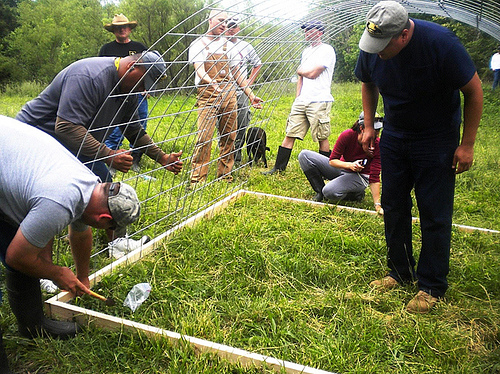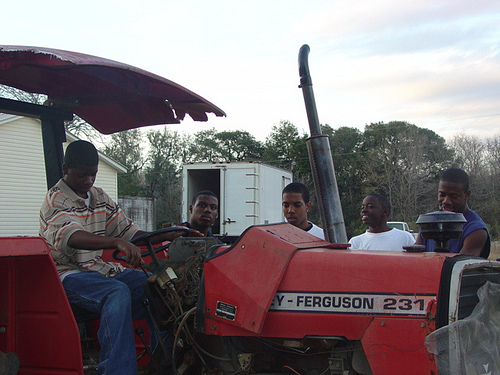
Military veterans-turned-beginning-farmers learn how to build mobile poultry units at an Armed to Farm workshop. Photo credit: University of Arkansas
For many military veterans and their families, the transition from the military to civilian life is a complex undertaking; however, reports and personal accounts indicate that many military veterans have discovered that farming offers a place for employment, training and healing. The problem is there are few educational programs tailored to meet the particular needs and abilities of returning veterans.
The National Institute of Food and Agriculture’s (NIFA) Beginning Farmer and Rancher Development Program (BFRDP) makes it possible to fill that gap in training. At the University of Arkansas, Dr. Dan Donoghue used BFRDP funds to develop internships, workshops and online courses that focus on the needs of veterans interested in pursuing farming after their service to our country. Read more »

We know that America’s farmers and rural communities are vitally important to our nation’s economy, producing the food, feed, fiber and fuel that continue to help us grow. There are hundreds of programs and resources available to help meet these efforts. However, sometimes it’s hard to know where to look. To overcome this challenge, the United States Department of Agriculture’s (USDA) National Agricultural Library, in partnership with the American Farm Bureau Federation, has created www.Start2Farm.gov ,an online database connecting beginning farmers and ranchers with available programs and resources. Read more »
This post is part of the Science Tuesday feature series on the USDA blog. Check back each week as we showcase stories and news from the USDA’s rich science and research portfolio.
Do you know who grew your food? Farmer’s markets, eating locally and even the USDA’s “Know your Farmer, Know your Food” campaign are all examples people wanting to know where their food comes from. But while the public’s interest in agriculture is rising, the age of the average American farmer is also on the rise. This is big concern for USDA and industry leadership – we wonder who will be growing your food in the future. Read more »

Young farmers in Florida participate in the New and Beginning Farmers Training Program to learn skills that will help them start successful farming operations.
The African-American farmer is a rare breed in the United States, and their numbers have declined dramatically over the past few decades. This trend, particularly, is due to the fact that young people are not entering the field to replace an increasingly aging population. In Florida, the average farmer’s age is 58.4, and approximately 45 percent of the farms in Florida are operated by farmers between 25 and 54 years of age. Read more »
When Denise Hamilton and her husband retire from their careers as teachers at West Jessamine County High School in Nicholasville, Kentucky, they plan to move to their new farm in Garrard County and supplement their retirement income by growing pasture-raised beef and organic vegetables.
“We just want to get back to the land, because that’s just who we are,” Hamilton said. “Back to who we are and also feel good about what we’re doing.”
The Hamiltons quickly realized they faced many challenges as beginning farmers. New farmers face unique challenges, including the rising cost of farmland and a lack of knowledge about how to get farmland, implement sustainable farming practices, and access operating capital to get started. Read more »



